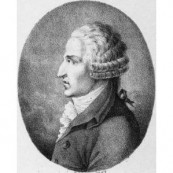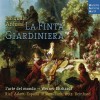Composers
Pasquale Anfossi (5 April 1727 – February 1797) was an Italian opera composer. Born in Taggia, Liguria, he studied with Niccolò Piccinni and Antonio Sacchini, and worked mainly in London, Venice and Rome.
He wrote more than 80 operas, both opera seria and opera buffa, although he concentrated on church music, especially oratorios, during his last years. Anfossi died in Rome in 1797.
Aiming at first to become a performer, he studied violin at the Neapolitan Loreto Conservatorium from 1744 to 1752, and played in an opera orchestra for ten years. He then turned to composing, studying with Sacchini and Piccinni. The first performance of his own work, the opera buffa La Serva Spiritosa was at the Rome Carnival in 1763, though his authorship of the work was not clearly established at the time. It appears he preferred to work under his teacher Sacchini, supplementing his tutor's works. Nevertheless, he made a breakthrough with his dramma giocoso L'incognita perseguitata in 1773 in Rome.
By 1782 he had written about 30 operas, performed mainly in Venice and Rome, although on occasion also in other parts of Italy and in Vienna. His first London performance was Il trionfo della costanza in 1782. He was engaged as musical director in London until 1786, where he performed five of his own operas and alternative versions of work by other composers; for example, Gluck's Orfeo ed Euridice with supplementary music by Johann Christian Bach and Händel. His works were not always well received: one critic wrote "the music suffers obviously from a tiring monotony" about his last opera in London, L'inglese in Italia.
Anfossi returned to Italy, and won back Roman public opinion in 1787 with the farsa Le pazzie de' gelosi at the Carnival. In 1789, the uninterrupted 20-year stretch of operatic composition stopped, and Anfossi restricted himself to church music. He was appointed Maestro di Capella of San Giovanni in Laterano, and held this position till his death in 1797.
Recently Added
Biography
Pasquale Anfossi (5 April 1727 – February 1797) was an Italian opera composer. Born in Taggia, Liguria, he studied with Niccolò Piccinni and Antonio Sacchini, and worked mainly in London, Venice and Rome.
He wrote more than 80 operas, both opera seria and opera buffa, although he concentrated on church music, especially oratorios, during his last years. Anfossi died in Rome in 1797.
Aiming at first to become a performer, he studied violin at the Neapolitan Loreto Conservatorium from 1744 to 1752, and played in an opera orchestra for ten years. He then turned to composing, studying with Sacchini and Piccinni. The first performance of his own work, the opera buffa La Serva Spiritosa was at the Rome Carnival in 1763, though his authorship of the work was not clearly established at the time. It appears he preferred to work under his teacher Sacchini, supplementing his tutor's works. Nevertheless, he made a breakthrough with his dramma giocoso L'incognita perseguitata in 1773 in Rome.
By 1782 he had written about 30 operas, performed mainly in Venice and Rome, although on occasion also in other parts of Italy and in Vienna. His first London performance was Il trionfo della costanza in 1782. He was engaged as musical director in London until 1786, where he performed five of his own operas and alternative versions of work by other composers; for example, Gluck's Orfeo ed Euridice with supplementary music by Johann Christian Bach and Händel. His works were not always well received: one critic wrote "the music suffers obviously from a tiring monotony" about his last opera in London, L'inglese in Italia.
Anfossi returned to Italy, and won back Roman public opinion in 1787 with the farsa Le pazzie de' gelosi at the Carnival. In 1789, the uninterrupted 20-year stretch of operatic composition stopped, and Anfossi restricted himself to church music. He was appointed Maestro di Capella of San Giovanni in Laterano, and held this position till his death in 1797.



